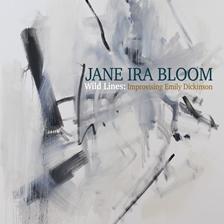Jazz and poetry are a natural fit. Langston Hughes, for example, a key figure in the Harlem Renaissance of the 1920s, was inspired by jazz and recorded his poems with accompaniment by jazz musicians. The same was true of Jack Kerouac and other beat poets of the 1950s. New releases present current prominent jazz musician/composers performing jazz pieces inspired by poets of the past with whom they have a kinship.
‘Wild Lines: Improvising Emily Dickinson’
Winner of the 2017 Downbeat Critics Poll for soprano saxophone, Jane Ira Bloom has released her latest recording with her quartet, “Wild Lines: Improvising Emily Dickinson” (on Outline). The double CD set has one CD with just the music played by the quartet: Dawn Clement (piano), Mark Helias (bass), and Bobby Previte (drums). On the second CD, the group is joined by actress Deborah Rush, who reads the poetry.







